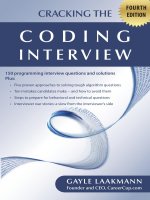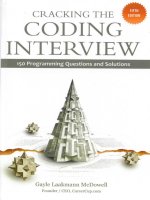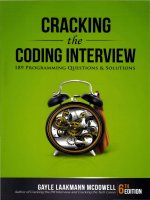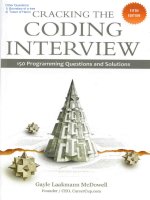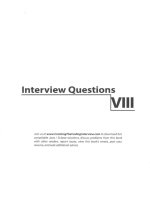Ebook Cracking the coding interview (5/E): Part 1
Bạn đang xem bản rút gọn của tài liệu. Xem và tải ngay bản đầy đủ của tài liệu tại đây (7.51 MB, 75 trang )
Other Questions:
1) Boundary of a tree
2) Tower of Hanoi
CRACKING THE
CODING
INTERVIEW
150 Programming Questions and Solutions
Gayle Laakmann McDowell
Founder / CEO, CareerCup.com
CRACKING THE
CODING
INTERVIEW
5th Edition
ALSO BY GAYLE LAAKMANN MCDOWELL
THE GOOGLE RESUME
How TO PREPARE FOR A CAREER AND LAND A JOB AT
APPLE, MICROSOFT, GOOGLE, OR ANY TOP TECH COMPANY
CRACKING THE
CODING
INTERVIEW
5th Edition
150 Programming
Questions and Solutions
GAYLE LAAKMANN MCDOWELL
Founder and CEO, CareerCup.com
CareerCup, LLC
Palo Alto, CA
CRACKING THE CODING INTERVIEW, FIFTH EDITION
Copyright © 2008 - 2013 by Gayle Laakmann McDowell.
All rights reserved. No part of this book may be reproduced in any form by any
electronic or mechanical means, including information storage and retrieval systems,
without permission in writing from the author or publisher, except by a reviewer who
may quote brief passages in a review.
Published by CareerCup, LLC, Palo Alto, CA. Version 5.01390210100131.
No part of this book may be used or reproduced in any manner without written permission except in the case of brief quotations in critical articles or reviews.
For more information, contact
978-0984782802 (ISBN 13)
To Pauline "Oma" Venti
for her eternal support
Table of Contents
Foreword
1
Introduction
2
I.
The Interview Process
5
Overview
6
How Questions are Selected
7
Timeline and Preparation Map
8
II.
III.
IV.
V.
VI.
VI
The Evaluation Process
10
Incorrect Answers
11
Dress Code
12
Top 10 Mistakes
13
Frequently Asked Questions
15
Behind the Scenes
17
The Microsoft Interview
19
The Amazon Interview
20
The Google Interview
21
The Apple Interview
22
The Facebook Interview
23
The Yahoo! Interview
24
Special Situations
25
Experienced Candidates
26
Testers and SDETs
27
Program and Product Managers
28
Dev Leads and Managers
30
Start-Ups
31
Before the Interview
33
Getting the Right Experience
34
Building a Network
35
Writing a Great Resume
37
Behavioral Questions
39
Behavioral Preparation
40
Handling Behavioral Questions
43
Technical Questions
45
Cracking the Coding Interview
Table of Contents
Technical Preparation
46
Handling Technical Questions
49
Five Algorithm Approaches
52
What Good Coding Looks Like
56
VII. The Offer and Beyond
61
Handling Offers and Rejection
62
Evaluating the Offer
63
Negotiation
65
On the Job
66
VIII. Interview Questions
67
Data Structures
69
Chapter 1 | Arrays and Strings
71
Chapter 2 | Linked Lists
75
Chapter 3 | Stacks and Queues
79
Chapter 41 Trees and Graphs
83
Concepts and Algorithms
87
Chapter 5 | Bit Manipulation
89
Chapter 6 | Brain Teasers
93
Chapter 7 | Mathematics and Probability
97
Chapters | Object-Oriented Design
103
Chapter 91 Recursion and Dynamic Programming
107
Chapter 10 | Scalability and Memory Limits
Ill
Chapter 11 | Sorting and Searching
117
Chapter 12 | Testing
123
Knowledge Based
131
Chapter 13 | C and C++
133
Chapter 14 | Java
141
Chapter 15 | Databases
147
Chapter 16 Threads and Locks
153
Additional Review Problems
161
Chapter 17 | Moderate
163
Chapter 18 Hard
.167
CrackingTheCodinglnterview.com
VII
Table of Contents
IX.
Solutions
169
Data Structures
171
Chapter 1 | Arrays and Strings
171
Chapter 2 | Linked Lists
183
Chapter 3 Stacks and Queues
201
Chapter 41 Trees and Graphs
219
Concepts and Algorithms
241
Chapter 5 | Bit Manipulation
241
Chapter 6 | Brain Teasers
257
Chapter? | Mathematics and Probability
263
Chapter 81 Object-Oriented Design
279
Chapter 9 | Recursion and Dynamic Programming
315
Chapter 10 | Scalability and Memory Limits
341
Chapter 11 Sorting and Searching
359
Chapter 12 | Testing
377
Knowledge Based
385
Chapter 13 | C and C++
385
Chapter 14 | Java
399
Chapter 15 | Databases
407
Chapter 16 | Threads and Locks
415
Additional Review Problems
429
Chapter 17 | Moderate
429
Chapter 18 | Hard
461
X.
Acknowledgements
491
XI.
Index
492
XII. About the Author .
Join us at www.CrackingTheCodinglnterview.com to download full,
compilable Java / Eclipse solutions, discuss problems from this book
with other readers, report issues, view this book's errata, post your
resume, and seek additional advice.
VIII
Cracking the Coding Interview
500
Foreword
Dear Reader,
Let's get the introductions out of the way.
I am not a recruiter. I am a software engineer. And as such, I know what it's like to be
asked to whip up brilliant algorithms on the spot, and then write flawless code on a
whiteboard. I know because I've been asked to do the same thing—in interviews at
Google, Microsoft, Apple, and Amazon, among other companies.
I also know because I've been on the other side of the table, asking candidates to do this.
I've combed through stacks of resumes to find the engineers who I thought might be
able to actually pass these interviews. And I've debated in Google's Hiring Committee
whether or not a candidate did well enough to merit an offer. I understand and have
experienced the full hiring circle.
And you, reader, are probably preparing for an interview, perhaps tomorrow, next week,
or next year. You likely have or are working towards a Computer Science or related
degree. I am not here to re-teach you the basics of what a binary search tree is, or how
to traverse a linked list. You already know such things, and if not, there are plenty of
other resources to learn them.
I am here to help you take your understanding of Computer Science fundamentals to
the next level, to learn how to apply those fundamentals to crack the coding interview.
The 5th edition of Cracking the Coding Interview updates the 4th edition with over 200
pages of additional questions, revised solutions, new chapter introductions, and other
content. Be sure to check out our website, www.careercup.com, to connect with other
candidates and discover new resources.
I'm excited for you and for the skills you are going to develop.Thorough preparation will
give you a wide range of technical and communication skills. It will be well-worth it no
matter where the effort takes you!
I encourage you to read these introductory chapters carefully. They contain important
insight that just might make the difference between a "hire"and a "no hire."
And remember—interviews are hard! In my years of interviewing at Google, I saw
some interviewers ask"easy"questions while others ask harder questions. But you know
what? Getting the easy questions doesn't make it any easier to get the offer. Receiving
an offer is not about solving questions flawlessly (very few candidates do!), but rather, it
is about answering questions better than other candidates. So don't stress out when you
get a tricky question—everyone else probably thought it was hard too.
Study hard, practice, and good luck!
Gayle L. McDowell
Founder / CEO, CareerCup.com
Author of The Google Resume and Cracking the Coding Interview
CrackingTheCodinglnterview.com
Introduction
Something's Wrong
We walked out of the hiring meeting frustrated, again. Of the ten "passable" candidates we reviewed that day, none would receive offers. Were we being too harsh, we
wondered?
I, in particular, was disappointed. We had rejected one of my candidates. A former
student. One who I had referred. He had a 3.73 GPA from the University of Washington,
one of the best computer science schools in the world, and had done extensive work on
open source projects. He was energetic. He was creative. He worked hard. He was sharp.
He was a true geek in all the best ways.
But, I had to agree with the rest of the committee: the data wasn't there. Even if my
emphatic recommendation would sway them to reconsider, he would surely get
rejected in the later stages of the hiring process. There were just too many red flags.
Though the interviewers generally believed that he was quite intelligent, he had struggled to solve the interview problems. Most successful candidates could fly through the
first question, which was a twist on a well-known problem, but he had trouble developing an algorithm. When he came up with one, he failed to consider solutions that
optimized for other scenarios. Finally, when he began coding, he flew through the code
with an initial solution, but it was riddled with mistakes that he then failed to catch.
Though he wasn't the worst candidate we'd seen by any measure, he was far from
meeting "the bar." Rejected.
When he asked for feedback over the phone a couple of weeks later, I struggled with
what to tell him. Be smarter? No, I knew he was brilliant. Be a better coder? No, his skills
were on-par with some of the best I'd seen.
Like many motivated candidates, he had prepared extensively. He had read K&R's classic
C book and he'd reviewed CLRS' famous algorithms textbook. He could describe in
detail the myriad of ways of balancing a tree, and he could do things in C that no sane
programmer should ever want to do.
I had to tell him the unfortunate truth: those books aren't enough. Academic books
prepare you for fancy research, but they're not going to help you much in an interview.
Why? I'll give you a hint: your interviewers haven't seen Red-Black Trees since they were
in school either.
To crack the coding interview, you need to prepare with real interview questions. You
must practice on real problems and learn their patterns.
Cracking the Coding Interview is the result of my first-hand experience interviewing
at top companies. It is the result of hundreds of conversations with candidates. It is the
result of the thousands of questions contributed by candidates and interviewers. And
it's the result of seeing so many interview questions from so many firms. Enclosed in
this book are 150 of the best interview questions, selected from thousands of potential
problems.
Cracking the Coding Interview
Introduction
My Approach
The focus of Cracking the Coding Interview is algorithm, coding and design questions.
Why? Because while you can and will be asked behavioral questions, the answers will be
as varied as your resume. Likewise, while many firms will ask so-called "trivia"questions
(e.g., "What is a virtual function?"), the skills developed through practicing these questions are limited to very specific bits of knowledge.The book will briefly touch on some
of these questions to show you what they're like, but I have chosen to allocate space
where there's more to learn.
My Passion
Teaching is my passion. I love helping people understand new concepts and giving
them tools so that they can excel in their passions.
My first "official" experience teaching was in college at the University of Pennsylvania
when I became a teaching assistant for an undergraduate Computer Science course
during my second year. I went on to TA for several other courses, and I eventually
launched my own CS course at the university focused on "hands-on" skills.
As an engineer at Google, training and mentoring "Nooglers"(yes, that's really what they
call new Google employees!) were some of the things I enjoyed most. I went on to use
my "20% time" to teach two Computer Science courses at the University of Washington.
Cracking the Coding Interview, The Google Resume, and CareerCup.com reflect my
passion for teaching. Even now, you can often find me "hanging oufatCareerCup.com,
helping users who stop by for assistance.
Join us.
Gayle L. McDowell
CrackingTheCodinglnterview.com
The Interview Process
I
I. The Interview Process | Overview
M
ost companies conduct their interviews in very similar ways. We will offer an overview of how companies interview and what they're looking for. This information
should guide your interview preparation and your reactions during and after the interview.
Once you are selected for an interview, you usually go through a screening interview.
This is typically conducted over the phone. College candidates who attend top schools
may have these interviews in-person.
Don't let the name fool you; the "screening" interview often involves coding and algorithms questions, and the bar can be just as high as it is for in-person interviews. If you're
unsure whether or not the interview will be technical, ask your recruiting coordinator
what position your interviewer holds. An engineer will usually perform a technical interview.
Many companies have taken advantage of online synchronized document editors, but
others will expect you to write code on paper and read it back over the phone. Some
interviewers may even give you "homework" to solve after you hang up the phone or
just ask you to email them the code you wrote.
You typically do one or two screening interviewers before being brought on-site.
In an on-site interview round, you usually have 4 to 6 in-person interviews. One of these
will be over lunch.The lunch interview is usually not technical, and the interviewer may
not even submit feedback. This is a good person to discuss your interests with and to
ask about the company culture. Your other interviews will be mostly technical and will
involve a combination of coding and algorithm questions. You should also expect some
questions about your resume.
Afterwards, the interviewers meet to discuss your performance and/or submit written
feedback. At most companies, your recruiter should respond to you within a week with
an update on your status.
If you have waited more than a week, you should follow up with your recruiter. If your
recruiter does not respond, this does nof mean that you are rejected (at least not at
any major tech company, and almost any other company). Let me repeat that again:
not responding indicates nothing about your status. The intention is that all recruiters
should tell candidates once a final decision is made.
Delays can and do happen. Follow up with your recruiter if you expect a delay, but be
respectful when you do. Recruiters are just like you. They get busy and forgetful too.
Cracking the Coding Interview
I. The Interview Process | How Questions are Selected
andidates frequently ask me what the "recent" interview questions are at a specific
company, assuming that the questions change over time. The reality is that the
company itself has typically little to do with selecting the questions. It's all up to the
interviewer. Allow me to explain.
C
At a large company, interviewers typically go through an interviewer training course.
My "training" course at Google was outsourced to another company. Half of the one-day
training course focused on the legal aspects of interviewing: don't ask a candidate if
they're married, don't ask about their ethnicity, and so on. The other half discussed
"troublesome"candidates: the ones who get angry or rude when asked a coding question or other questions they think are "beneath" them. After the training course, I "shadowed" two real interviews to show me what happened in an interview—as though I
didn't already know! After that, I was sent off to interview candidates on my own.
That's it.That's all the training we got—and that's very typical of companies.
There was no list of "official Google interview questions." No one ever told me that I
should ask a particular question, and no one told me to avoid certain topics.
So where did my questions come from? From the same places as everyone else's.
Interviewers borrow questions that they were asked as candidates. Some swap questions amongst each other. Others look on the internet for questions, including—yes—
on CareerCup.com. And some interviewers take questions from the earlier mentioned
resources and tweak them in minor or major ways.
It's unusual for a company to ever give interviewers a list of questions. Interviewers pick
their own questions and tend to each have a pool of five or so questions that they prefer.
So next time you want to know what the "recent" Google interview questions are, stop
and think. Google interview questions are really no different from Amazon interview
questions since the questions aren't decided at a company-wide level. The "recent"
questions are also irrelevant. Questions don't change much over time since no one's
telling anyone what to do.
There are some differences in broad terms across companies. Web-based companies are
more likely to ask system design questions, and a company using databases heavily is
more likely to ask you database questions. Most questions, however, fall into the broad
"data structures and algorithms"category and could be asked by any company.
CrackingTheCodinglnterview.com
I. The Interview Process | Timeline and Preparation Map
A
cing an interview starts well before the interview itself—years before, in fact.
You need to get the right technical experience, apply to companies, and begin
preparing to actually solve questions. The following timeline outlines what you should
be thinking about when.
If you're starting late into this process, don't worry. Do as much "catching up"as you can,
and then focus on preparation. Good luck!
1+Years
(before interview)
Build projects outside
of school/work.
Expand Network.
Professionals: focus
work on "meaty"
projects.
Students: find internship and take classes
with large projects.
Build website/portfolio showcasing your
experience.
Continue to work on
projects. Try to add on
one more project.
Create draft of resume
and send it out for a
resume review.
Read intro sections
of CtCI (Cracking the
Coding Interview).
Make target list of
preferred companies.
Begin practicing interview questions using
Java or C++.
Form mock interview
group with friends to
interview each other.
Create list to track
mistakes you've made
solving problems.
Do mini-projects to
solidify understanding
of key concepts.
Continue to practice
interview questions.
Do several mock interviews.
Create interview prep
grid.
Review/ update
resume.
Cracking the Coding Interview
I. The Interview Process | Timeline and Preparation Map
Continue to practice
questions, writing
code on paper.
Re-read intro to CtCi,
especially Tech &
Behavioral section.
Do another mock
interview.
Phone Interview:
Locate / buy headset
On-site interview: Get
interview outfit dry
cleaned if necessary.
Do a final mock
interview.
Rehearse stories
from the interview
prep grid.
Re-read 5 Algorithm
Approaches.
Review list of your
mistakes.
Continue to practice
interview questions.
On-site interview: Print
1 0 copies of resume &
put them into folder.
Continue to practice
questions & review
your list of mistakes.
Review Powers of 2
List. Print list if a phone
screen.
Re-read 5 Algorithm
Approaches. Make sure
you remember them.
Rehearse each story
from interview prep
grid once.
Wake up in plenty of
time to eat a good
breakfast & be on time.
Be Confident {Not
Cocky!).
If no offer, ask when
you can re-apply. Don't
give up hope!
If you haven't heard
from recruiter, check in
after one week.
Write ThankYou note
to recruiter.
CrackingTheCodinglnterview.com
I. The Interview Process | The Evaluation Process
M
ost recruiters will probably tell you that candidates are evaluated on four aspects:
prior experience, culture fit, coding skills, and analytical ability.These four components are certainly all in play, but typically, the decision comes down to your coding
skills and your analytical ability (or intelligence).This is why most of this book is devoted
to improving your coding and algorithm skills.
However, just because the decision usually comes down to coding and algorithm skills
doesn't mean you should overlook the other two as factors.
At bigger tech companies, your prior experience tends not to be a direct deciding factor
once you're actually interviewing, but it may bias an interviewer's perception of the rest
of your interview. For example, if you demonstrate brilliance when you discuss some
tricky program you wrote, your interviewer is more likely to think, "Wow, she's brilliant!"
And once he's decided that you're smart, he's more likely to subconsciously overlook
your little mistakes. Interviewing, after all, is not an exact science. Preparing for "softer"
questions is well worth your time.
Culture fit (or your personality, particularly with relation to the company) tends to
matter more at smaller companies than at big companies. One way it might come up
is if the company's culture is to let employees make decisions independently, and you
need direction.
It's not unusual for a candidate to get rejected because they appear too arrogant, argumentative, or defensive. I once had a candidate blame his struggling with a question
on my wording of the problem, and later, on the way that I'd coached him through it. I
recorded this defensiveness as a potential red flag—and, as it turns out, so did the other
interviewers. He was rejected. Who wants to work with a teammate like that?
What this means for you is the following:
•
If people often perceive you as arrogant or argumentative, or with any other nasty
adjectives, keep an eye on this behavior in an interview. Even an otherwise superstar
candidate may get rejected if people don't want to work with them.
•
Spend some time preparing for questions about your resume. It's not the most
important factor, but it matters. Even a little bit of time here can help you improve in
major ways. It's a great "bang for your buck."
•
Focus mainly on coding and algorithm questions.
Finally, it's worth noting that interviewing is not a perfect science. There is some randomness not only in your performance, but also in the decision of the hiring committee (or
whoever decides on your offer). Like any group, the hiring committee is easily swayed
by the most outspoken individuals. It may not be fair, but that's the way it is.
And remember—a rejection is not a life sentence. You can almost always reapply within
a year, and many candidates get offers from companies that previously rejected them.
Don't get discouraged. Keep at it.
10
Cracking the Coding Interview
I.The Interview Process | Incorrect Answers
ne of the most pervasive—and dangerous—rumors is that candidates need to get
every question right. That's not even close to true.
O
First, responses to interview questions shouldn't be thought of as "correct" or "incorrect."
When I evaluate how someone performed in an interview, I never ask myself, how many
questions did they get right? Rather, it's about how optimal your final solution was, how
long it took you to get there, and how clean your code was. It's not a binary right vs.
wrong; there are a range of factors.
Second, your performance is evaluated in comparison to other candidates. For example,
if you solve a question optimally in 15 minutes, and someone else solves an easier question in five minutes, did that person do better than you? Maybe, but maybe not. If you
are asked really easy questions, then you might be expected to get optimal solutions
really quickly. But if the questions are hard, then a number of mistakes are expected.
In evaluating thousands of hiring packets at Google, I have only once seen a candidate
have a "flawless"set of interviews. Everyone else, including the hundreds who got offers,
made mistakes.
CrackingTheCodinglnterview.com
I
11
I. The Interview Process | Dress Code
S
oftware engineers and those in similar positions typically dress less formally. This is
reflected in the appropriate interview attire. A good rule of thumb for any interview
is to dress one small notch better than the employees in your position.
More specifically, I would recommend the following attire for software engineering
(and testing) interviews. These rules are designed to put you in the "safe zone": not too
dressy, and not too casual. Many people interview at start-ups and big companies in
jeans and a t-shirt and don't face any problems. After all, your coding skills matter far
more than your sense of style.
Start-Ups
Microsoft, Google,
Amazon, Facebook,
e.t.c.
Non-Tech Companies
(including banks)
Men
Khakis, slacks, or
nice jeans. Polo shirt
or dress shirt.
Khakis, slacks, or nice
jeans. Polo shirt or
dress shirt.
Suit, no tie. (Consider
bringing a tie just in
case.)
Women
Khakis, slacks, or
nice jeans. Nice top
or sweater.
Khakis, slacks, or nice
jeans. Nice top or
sweater.
Suit, or nice slacks with
a nice top.
These are just good advisements, and you should consider the culture of the company
with which you're interviewing. If you are interviewing for a Program Manager, Dev
Lead, or any role closer to management or the business side, you should lean towards
the more dressy side.
12
Cracking the Coding Interview
I. The Interview Process | Top 10 Mistakes
#1 | Practicing on a Computer
If you were training for an ocean swim race, would you practice only by swimming in a
pool? Probably not. You'd want to get a feel for the waves and other"terrain"differences.
I bet you'd want to practice in the ocean, too.
Using a compiler to practice interview questions is like doing all your training in the
pool. Put away the compiler and get out the old pen and paper. Use a compiler only to
verify your solutions after you've written and hand-tested your code.
#2 | Not Rehearsing Behavioral Questions
Many candidates spend all their time prepping for technical questions and overlook the
behavioral questions. Guess what? Your interviewer is judging those too!
And, not only that—your performance on behavioral questions might bias your interviewer's perception of your technical performance. Behavioral prep is relatively easy
and well-worth your time. Look over your projects and positions and rehearse your key
stories.
#3 | Not Doing a Mock Interview
Imagine you're preparing for a big speech. Your whole school, company, or whatever
will be there. Your future depends on this. You'd be crazy to only practice the speech
silently in your head.
Not doing a mock interview to prepare for your real one is just like this. If you're an
engineer, you must know other engineers. Grab a buddy and ask him/her to do a mock
interview with you. You can even return the favor!
#4 | Trying to Memorize Solutions
Memorizing the solution to a specific problem will help you solve that one if it comes up
in an interview, but it won't help you to solve new problems. It's very unlikely that all, or
even most, of your interview questions will come from this book.
It's much more effective to try to struggle through the problems in this book yourself,
without flipping to the solutions.This will help you develop strategies to approach new
problems. Even if you review fewer problems in the end, this kind of preparation will go
much further. Quality beats quantity.
#5 |Not Solving Problems Out Loud
Psst—let me tell you a secret: I don't know what's going on in your head. So if you aren't
talking, I don't know what you're thinking. If you don't talk for a long time, I'll assume
that you aren't making any progress. Speak up often, and try to talk your way through a
solution. This shows your interviewer that you're tackling the problem and aren't stuck.
CrackingTheCodinglnterview.com
13
I. The Interview Process | Top Ten Mistakes
And it lets them guide you when you get off-track, helping you get to the answer faster.
Best of all, it demonstrates your awesome communication skills. What's not to love?
#6 | Rushing
Coding is not a race, and neither is interviewing. Take your time when working on a
coding problem. Rushing leads to mistakes and suggests that you are careless. Go
slowly and methodically, testing often and thinking through the problem thoroughly.
In the end, you'll finish the problem in less time and with fewer mistakes.
#7 | Sloppy Coding
Did you know that you can write bug-free code but still perform horribly on a coding
question? It's true! Duplicated code, messy data structures (i.e., lack of object-oriented
design), and so on. Bad, bad, bad! When you write code, imagine you're writing for realworld maintainability. Break code into sub-routines, and design data structures to link
appropriate data.
#8 | Not Testing
You probably wouldn't write code in the real world without testing it, so why do that in
an interview? When you finish writing code in an interview,"run" (or walk through) the
code to test it. Or, on more complicated problems, test the code while writing it.
#9 | Fixing Mistakes Carelessly
Bugs will happen; they're just a matter of life, or of coding. If you're testing your code
carefully, then you will probably discover bugs. That's okay.
The important thing is that when you find a bug, you think through why it occurred
before fixing it. Some candidates, when they find that their function returns false for
particular parameters, will just flip the return value and check if that fixes the issue. Of
course, it rarely does; in fact, it tends to create even more bugs and demonstrates that
you're careless.
Bugs are acceptable, but changing your code randomly to fix the bugs is not.
#10 | Giving Up
I know interview questions can be overwhelming, but that's part of what the interviewer is testing. Do you rise to a challenge, or do you shrink back in fear? It's important
that you step up and eagerly meet a tricky problem head-on. After all, remember that
interviews are supposed to be hard. It shouldn't be a surprise when you get a really
tough problem.
14
Cracking the Coding Interview
I. The Interview Process | Frequently Asked Questions
Should I tell my interviewer if I know a question?
Yes! You should definitely tell your interviewer if you've previously heard the question.
This seems silly to some people—if you already know the question (and answer), you
could ace the question, right? Not quite.
Here's why we strongly recommend that you tell your interviewer that you've heard the
problem before:
1. Big honesty points. This shows a lot of integrity—that's huge! Remember that the
interviewer is evaluating you as a potential teammate. I don't know about you, but I
personally prefer to work with honest people.
2. The question might have changed ever so slightly. You don't want to risk repeating
the wrong answer.
3. If you easily belt out the right answer, it's obvious to the interviewer. They know
how difficult a problem is supposed to be. If you instead try to pretend to struggle
through a problem, you may very well wind up "struggling" too much and coming
off unqualified.
What language should I use?
Many people will tell you to use whatever language you're most comfortable with, but
ideally you want to use a language that your interviewer is comfortable with. I'd usually
recommend coding in either C, C++ or Java, as the vast majority of interviewers will be
comfortable in one of these languages. My personal preference for interviews is Java
(unless it's a question requiring C / C++), because it's quick to write and almost everyone
can read and understand Java, even if they code mostly in C++. For this reason, almost
all the solutions in this book are written in Java.
I didn't hear back immediately after my interview. Am I rejected?
No. Almost every company intends to tell candidates when they're rejected. Not hearing
back quickly could mean almost anything. You might have done very well, but the
recruiter is on vacation and can't process your offer yet. The company might be going
through a re-org and be unclear what their head count is. Or, it might be that you did
poorly, but you got stuck with a lazy or overworked recruiter who hasn't gotten a chance
to notify you. It would be a strange company that actually decides, "Hey, we're rejecting
this person, so we just won't respond." It's in the company's best interest to notify you of
your ultimate decision. Always follow up.
Can I re-apply to a company after getting rejected?
Almost always, but you typically have to wait a bit (6 months - 1 year). Your first bad
interview usually won't affect you too much when you re-interview. Lots of people get
rejected from Google or Microsoft and later get offers.
CrackingTheCodinglnterview.com
15
